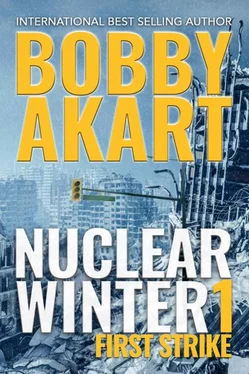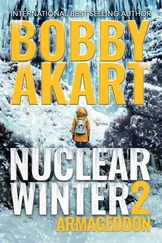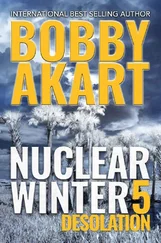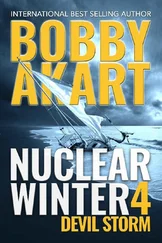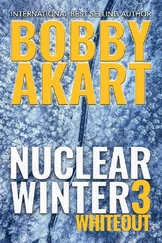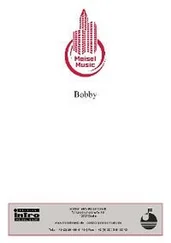Thursday, October 24
Driftwood Key
Mike wasn’t able to sleep. He and Jessica had worked well into the evening, assisting Monroe County sheriff’s deputies as they directed traffic in and out of the Florida Keys. At one point, in Key Largo, two drunk drivers ran into one another, triggering an all-out brawl where Atlantic Boulevard intersected with U.S. 1. It was a notoriously busy intersection where several streets came together, as well as multiple pedestrian crosswalks.
The two drunken men broke out in a fistfight. This triggered their inebriated girlfriends to join the fray. Soon other motorists, perturbed at the delay, tried to force their way past the wrecked cars in the center of the intersection. Push came to shove, literally, as bumpers were used to clear a path through. This resulted in more anger. When one of the motorists pulled a handgun and began to fire into the air, ostensibly to bring order to the mayhem, panic ensued.
The gunfire caused drivers to seek safety. They drove over curbs to race into parking lots. Some chose the median as the four-lane highway through Key Largo split. The median of the divided highway was soon filled with cars racing down the sidewalk, through parking lots of businesses, and over native plant material.
When order was finally restored, a fender bender between drunks resulted in four pedestrians being sent to the hospital, another half dozen with superficial wounds, and multiple accidents.
However, it was not news of the Key Largo madness that upset Mike the most. It was the fact he’d lost all assistance from the FDLE, and the detectives were turned into traffic cops, including himself.
That evening, as the drinks flowed, Mike and Jessica had vowed to call out sick the next day. During their entire career with the MCSO, neither had contracted the so-called blue flu , an act of defiance by law enforcement officers under the pretext of being ill. In this case, they simply wanted to catch a killer.
Hank raised a legitimate question. He’d asked, “In the scheme of things, wouldn’t it be better to protect the living rather than worry about the dead?”
Mike disagreed with his brother and was blunt in his response. “There’ll be more dead if we don’t catch this guy.”
The long evening stretched into the early morning hours of the next day. The group finally called it a night, with Hank going to bed first. Jessica was sound asleep as Mike stared at the ceiling, fuming over the day’s events and contemplating the ramifications of bucking his superiors.
Just as he was about to doze off, both of their cell phones began to vibrate and emit an alert. The buzz and tone had the same sound as those used for Amber alerts and catastrophic weather warnings. Unlike the Amber and weather alerts, cell phone users cannot mute, silence, or turn off the presidential alert, as it was called. The message was meant to include critical lifesaving information, such as a nuclear attack.
It was 3:17 a.m. The continuous rhythmic tone shook Jessica awake and prompted Mike to jump out of bed in search of his phone. Then the computer-generated voice made the announcement.
“ Attention. Attention. This is the National Warning Center. Emergency.
This is an Attack Warning. Repeat. This is an Attack Warning .”
At that moment, across America and its territories, FEMA interrupted radio and television broadcasts. The FAA sent alerts to all airborne pilots and air traffic control centers. NOAA interrupted its weather radio network. The Coast Guard broadcast nuclear war warnings to all mariners at sea in the Atlantic, Pacific, and Gulf of Mexico.
IPAWS, the acronym for the Integrated Public Alert and Warning System, combined the Emergency Alert System used for decades with the new addition, the Wireless Emergency Alerts System. It was functioning on all cylinders.
Nine minutes after the nuclear ICBMs were launched from North Korea toward the U.S., the warnings were activated. It was estimated the incoming nukes would strike their West Coast targets within twenty-two minutes. The East Coast had two minutes beyond that.
“What did it say?” asked Jessica, who was still groggy from the drinks and the limited sleep.
“It said the shit just hit the fan,” replied Mike as he searched for the light switch. The couple was staying in a guest room upstairs that they hadn’t used in a while. It was located at the end of the hall on the opposite side of the house where Hank’s master bedroom was located.
With the lights on, he scrambled to get his clothes on. He was desperate to get downstairs and turn on the television. Jessica stayed in bed with the sheet pulled up over her chest. She tried to read the alert on her phone with just one eye open.
Mike raced out of their room to wake up Hank. Just as he reached his door, Hank flung it open, half-dressed.
“You got it, too?” Hank asked his brother.
“Yeah.”
“Do you think it’s real or a false alarm like before?”
“I’m about to find out,” Mike responded. Barefoot, he hustled down the wide, sweeping staircase leading to the foyer of the main house. He rushed into the bar, turned on the lights, and skipped looking for the remote. He reached up to turn on the television, which had been on CNN for days during the drama. The screen confirmed his greatest fear.
“God help us.”
The voice was Phoebe’s. She stood in the opening with Sonny and Jimmy. Hank and Jessica arrived behind them. All of their eyes were transfixed on the television. Their mouths were agape but couldn’t speak a word.
Thursday, October 24
Falls Church, Virginia
Peter had stayed up for hours drinking the last beers in his refrigerator and eating two frozen CPK pizzas. He couldn’t recall the last time he’d been depressed and wasn’t sure if that was what he was going through now. He scoured online news sources and monitored social media for any indication of what might be happening on the Korean Peninsula. His mind constantly wandered to Jenna. He missed having her to text with, or even for their occasional sleepovers. Moreover, he worried for her safety when he should’ve been worried about his own.
Mentally exhausted and just a little drunk, he went to bed, leaving the muted television on with BBC International playing. His cell phone had fallen between the seat cushions of his couch. The lights were on. All out of character for the man who normally kept his condo neat. Tonight, he simply wasn’t interested in being responsible.
Peter bypassed the usual stages of sleep and went directly into REM sleep characterized by rapid eye movement and dreaming. Physiologically, REM was very different from stages one through four of the sleep processes. Muscles become atonic, meaning without movement. Breathing became erratic, and the body’s heart rate increased dramatically.
During REM, dreams became more vivid and were often remembered upon awakening. External stimuli, such as sounds and movements, were sometimes disregarded by the brain despite the fact they were real. Oftentimes, it was difficult to differentiate between the visions of the dream and the actual sounds surrounding the sleeper.
Peter’s dream was an odd combination of his past interactions with Jenna and a nightmarish apocalyptic movie that was part Walking Dead , part Thirteen Days , the story of the Cuban Missile Crisis featuring Kevin Costner.
In his dream, he’d placed himself in the bunker with the president, visualizing the decision-making process in real time. He heard the warning signals being emitted from the myriad of computer stations in the control room filled with snappily dressed military leaders. Then his dreamy state rushed outside the safe confines of the bunker, where it witnessed a fireball followed by a mushroom cloud.
Читать дальше
